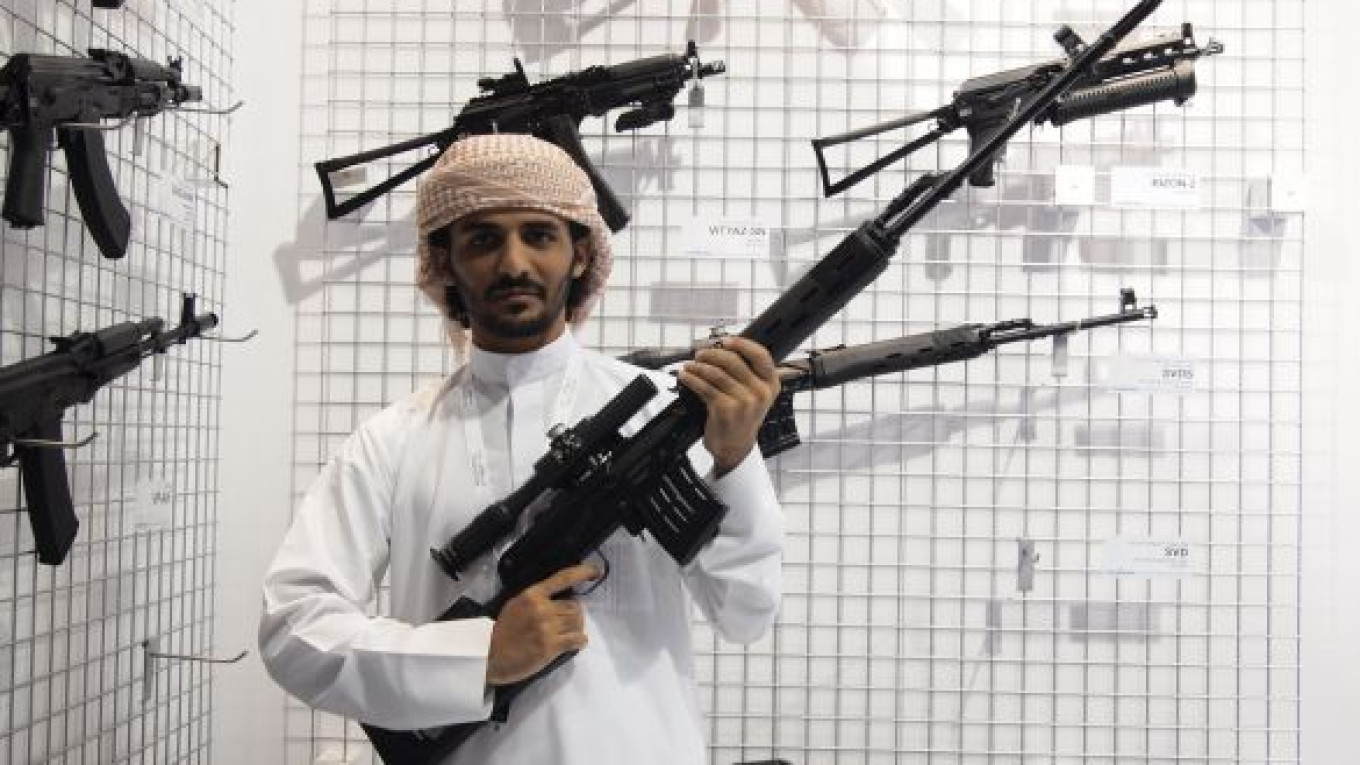ABU DHABI, United Arab Emirates — The IDEX arms exhibition, the biggest weapons trade show in the Middle East, attracted hundreds of visitors to the stands of numerous Russian arms producers but did not see any major breakthrough for the country's defense industry.
Aircraft producer Sukhoi reached a preliminary agreement to supply Su-35 jet fighters to China, Vyacheslav Dzirkaln, a deputy head of the government commission for cooperation in military technology, said during the expo, which ended late last week.
Dzirkaln didn't specify how many planes would be sold to China. He said, however, that Russia would not sell China a license to manufacture Su-35s, a step Russia has been reluctant to take because experts say it is afraid China will sell them to other countries.
A $116 million contract to supply ammunition to the UAE military was awarded to Tula-based KBP Instrument Design Bureau, a producer of Pantsyr surface-to-air missile systems and Kornet-EM anti-tank guided missiles.
"It seems that Russia is back in the business of selling military equipment to the UAE. Moscow appears to be headed in the right direction by providing training and maintenance," said Theodore Karasik, a senior analyst at the Dubai-based INEGMA think tank.
"For the Kremlin and Rosoboronexport, these developments at IDEX 2013 are a huge plus, with political and economic implications," he added.
Overall, the UAE purchased arms worth $1.34 billion from various countries, IDEX organizers said.
Experts said that for the members of the Russian delegation, headed by Deputy Prime Minister Dmitry Rogozin and Industry and Trade Minister Denis Manturov, the trade show was an important tool for attracting attention amid several Middle Eastern conflicts.
"Russia was the only country at the exhibition that truly demonstrated a full spectrum of defense equipment: small arms, light and heavy artillery, armored vehicles and air defense. Other countries did not provide their whole range," Nikolai Dimidyuk, director for special projects at arms exporter Rosoboronexport, told reporters during the expo.
He added that the Russian stand, at which 30 companies were represented, was visited by 15 delegations from various? counties.
The stand of Almaz-Antey, the producer of S-400 Triumph and S-300 surface-to-air missile systems, was among the most-visited by foreign delegations despite showing only replicas of the original weapons.
Interestingly enough, 20 years ago the company brought a genuine S-300 system to the first IDEX, Almaz-Antey Deputy CEO Gennady Slipchenko said proudly.
"We brought two S300-PMU 1 systems to Abu-Dhabi. ... Two real-life shooting targets were launched into air and both were hit. Not a single miss," he said.
"The Americans did not bring their Patriot system for a live demonstration to the exhibition then. They refused. They knew we were coming, and they opted not to compete," Dimidyuk said.
Defense expert Igor Korotchenko, editor-in-chief of National Defense magazine, said Russia is still interested in selling S-300 systems to Iran despite not doing that during Dmitry Medvedev's presidency.
"Today [the decision] might be reconsidered by Putin, since it is becoming more useful for Russia's interests. By strengthening Iran, we are trying to protect our Caspian interests in case of a conflict," Korotchenko said.
Praising the quality of Russian arms, producers also said that the country needs to upgrade its military technology and cooperate with foreign partners in some fields.
Sergei Rusakov, CEO of Tekhmash, told the Moscow Times during the expo that his company is seeking new ideas and innovative technologies from abroad.
"We keep up with the pace of modern technological development and are not ashamed to learn from the expertise of other countries and share our own expertise," Rusakov said. "Knowledge sharing and its integration into business processes is a normal practice all over the world. It works both ways."
As an example of knowledge transfer, Rusakov cited arms manufacturer Basalt's RPG-32 grenade launcher prototype,? produced in Jordan by a local company under the Nash-Shab brand name.
Still, Russian military commanders complain that the quality of Russian weapons sold domestically is often lower than that of those sold to foreign countries.
Among the recent examples is the modernized version of the T-72 battle tank, Izvestia reported last week, citing a report sent by military commanders to Defense Minister Sergei Shoigu.
The maintenance of exported Russian arms needs to be improved, said Ekber Onuk, an executive at Turkey's ONUK-BG Defense Systems Research and Development.
"Russia has a lot of brain power," Onuk said. "But in spite of all the fine engineering, maintenance is poor."
Contact the authors at a.bratersky@imedia.ru and bizreporter@imedia.ru
Related articles:
A Message from The Moscow Times:
Dear readers,
We are facing unprecedented challenges. Russia's Prosecutor General's Office has designated The Moscow Times as an "undesirable" organization, criminalizing our work and putting our staff at risk of prosecution. This follows our earlier unjust labeling as a "foreign agent."
These actions are direct attempts to silence independent journalism in Russia. The authorities claim our work "discredits the decisions of the Russian leadership." We see things differently: we strive to provide accurate, unbiased reporting on Russia.
We, the journalists of The Moscow Times, refuse to be silenced. But to continue our work, we need your help.
Your support, no matter how small, makes a world of difference. If you can, please support us monthly starting from just $2. It's quick to set up, and every contribution makes a significant impact.
By supporting The Moscow Times, you're defending open, independent journalism in the face of repression. Thank you for standing with us.
Remind me later.


